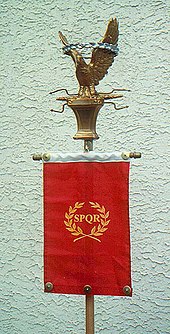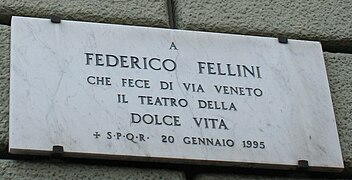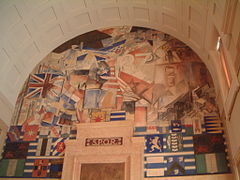Spqr
SPQR, an acronym for Senatus PopulusQue Romanus (Classical Latin: ; transl. The Senate and the Roman People), is an emblematic phrase referring to the government of the Roman Republic.
It appears on documents made public by an inscription in stone or metal, in dedications of monuments and public works, and on some Roman currency.
The full phrase appears in Roman political, legal, and historical literature, such as the speeches of Cicero and Ab Urbe Condita Libri (Books from the Founding of the City) of Livy.
Translation
In Latin, Senātus is a nominative singular noun meaning "Senate". Populusque is compounded from the nominative noun Populus, "the People", and -que, an enclitic particle meaning "and" which connects the two nominative nouns. The last word, Rōmānus ("Roman"), is an adjective modifying the whole of Senātus Populusque: the "Roman Senate and People", taken as a whole. Thus, the phrase is translated literally as "The Roman Senate and People", or more freely as "The Senate and People of Rome".
Historical context

The title's date of establishment is unknown, but it first appears in inscriptions of the Late Republic, from around 80 BC onwards. Previously, the official name of the Roman state, as evidenced on coins, was simply ROMA. The abbreviation last appears on coins of Constantine the Great (ruled 312–337 AD), the first Roman emperor to support Christianity.[citation needed]
The two legal entities mentioned, Senātus and the Populus Rōmānus, are sovereign when combined. However, where populus is sovereign alone, Senātus is not. Under the Roman Kingdom, neither entity was sovereign. The phrase, therefore, can be dated to no earlier than the foundation of the Republic.[citation needed]
This signature continued in use under the Roman Empire. The emperors were considered the de jure representatives of the people even though the senātūs consulta, or decrees of the Senate, were made at the de facto pleasure of the emperor.[citation needed]
Populus Rōmānus in Roman literature is a phrase meaning the government of the People. When the Romans named governments of foreign states, they used populus in the singular or plural, such as populī Prīscōrum Latīnōrum, "the governments of the Old Latins". Rōmānus is the established adjective used to distinguish the Romans, as in cīvis Rōmānus, "Roman citizen".[citation needed]
The Roman people appear very often in law and history in such phrases as dignitās, maiestās, auctoritās, lībertās populī Rōmānī, the "dignity, majesty, authority, freedom of the Roman people". They were a populus līber, "a free people". There was an exercitus, imperium, iudicia, honorēs, consulēs, voluntās of this same populus: "the army, rule, judgments, offices, consuls and will of the Roman people". They appear in early Latin as Popolus and Poplus, so the habit of thinking of themselves as free and sovereign was quite ingrained.[citation needed]
The Romans believed that all authority came from the people. It could be said that similar language seen in more modern political and social revolutions directly comes from this usage. People in this sense meant the whole government. The latter, however, was essentially divided into the aristocratic Senate, whose will was executed by the consuls and praetors, and the comitia centuriāta, "committee of the centuries", whose will came to be safeguarded by the Tribunes.[citation needed]
One of the ways the emperor Commodus (180–192) paid for his donatives and mass entertainments was to tax the senatorial order, and on many inscriptions, the traditional order is provocatively reversed (Populus Senatusque...).[citation needed]
Medieval use
Beginning in 1184, the Commune of Rome struck coins in the name of the SENATVS P Q R. From 1414 until 1517, the Roman Senate struck coins with a shield inscribed SPQR.
Modern use
During the regime of Benito Mussolini, SPQR was emblazoned on a number of public buildings and manhole covers in an attempt to promote his dictatorship as a "New Roman Empire".[citation needed]

Even in contemporary usage, SPQR is still used in the municipal coat of arms of Rome and as abbreviation for the comune of Rome in official documents. The Italians have long used a different and humorous expansion of this abbreviation, "Sono Pazzi Questi Romani" (literally: "They're crazy, these Romans"). SPQR is also part of the coat of arms of the Capital Military Command of the Italian army (Italian: Comando Militare Capitale).
In business, in English-speaking countries, SPQR is sometimes (humorously) used to mean "Small Profits, Quick Returns", often by people who have studied Latin at school.[citation needed]
Civic references



This section needs additional citations for verification. (February 2018) |
SPQx is sometimes used as an assertion of municipal pride and civic rights. The Italian town of Reggio Emilia, for instance, has SPQR in its coat of arms, standing for Senatus Populusque Regiensis. There have been confirmed usages and reports of the deployment of the "SPQx" template in:
| City | Country | SPQx | Latin | Where has it been used |
|---|---|---|---|---|
| Alkmaar |  Netherlands Netherlands | SPQA | On the façade of the Waag building. | |
| Amsterdam |  Netherlands Netherlands | SPQA | Senatus Populusque Amstelodamensis | At the Stadsschouwburg theater on Leidseplein and some of the bridges. |
| Antwerp |  Belgium Belgium | SPQA | Senatus Populusque Antverpensis | On Antwerp City Hall and other public buildings and schools. |
| Ascoli Piceno |  Italy Italy | SPQA | Senatus Populusque Asculum | On the wall above the south loggia of the Piazza del Popolo, Ascoli Piceno. |
| Basel |  Switzerland Switzerland | SPQB | Senatus Populusque Basilea | On the Webern-Brunnen in Steinenvorstadt. |
| Benevento |  Italy Italy | SPQB | Senatus Populusque Beneventanus | On manhole covers. |
| Bologna |  Italy Italy | SPQB | Senatus Populusque Bonononiensis | On the Fountain of Neptune, Bologna. |
| Bremen |  Germany Germany | SPQB | In the Bremen City Hall. | |
| Bruges |  Belgium Belgium | SPQB | On its coat of arms. | |
| Brussels |  Belgium Belgium | SPQB | Senatus Populusque Bruxellensis (of the city) or Senatus Populusque Belgicus (of the country) | Found repeatedly on the Palais de Justice, over the main stage of La Monnaie,[citation needed] and on the ceiling of the hemicycle of the Belgian Senate in the Palais de la Nation. |
| Capua |  Italy Italy | SPQC | ||
| Catania |  Italy Italy | SPQC | Can be found on manhole covers. | |
| Chicago |  United States United States | SPQC | Senatus Populusque Chicago | Can be found on the George N. Leighton Cook County Criminal Courthouse. |
| Dublin |  Ireland Ireland | SPQH | Senatus Populusque Hibernicus | On the City Hall, built in 1769. |
| Florianópolis |  Brazil Brazil | SPQF | Senatus Populusque Florianopolitanus | |
| Franeker |  Netherlands Netherlands | SPQF | At the a gate on the Westerbolwerk and Academiestraat 16. | |
| Freising |  Germany Germany | SPQF | Above the door of the town hall. | |
| Ghent |  Belgium Belgium | SPQG | Senatus Populusque Gandavensis | On the Opera, Theater and some other major buildings. Inscribed on a shield on coins struck in Ghent in 1583, during the Dutch Revolt. |
| Groningen |  Netherlands Netherlands | SPQG | Above the entrance of the Der Aa-kerk. | |
| The Hague |  Netherlands Netherlands | SPQH | Above the stage in Koninklijke Schouwburg. | |
| Hamburg |  Germany Germany | SPQH | On a door in the Hamburg Rathaus. | |
| Hanover |  Germany Germany | |||
| Haarlem |  Netherlands Netherlands | SPQH | On the face of the town hall at the "Grote Markt". | |
| Hasselt |  Belgium Belgium | SPQH | ||
| Kortrijk |  Belgium Belgium | SPQC | Senatus Populusque Cortoriacum | City hall. |
| Kraków |  Poland Poland | SPQC | Senatus Populusque Cracoviensis | Over the Waza Gate in Wawel Castle. |
| La Plata |  Argentina Argentina | SPQR | On a monument outside of the city's "casco urbano". | |
| Leeuwarden |  Netherlands Netherlands | SPQL | Senatus Populusque Leovardia | On the mayor's chain of office. |
| Liverpool |  United Kingdom United Kingdom | SPQL | Senatus Populusque Liverpudliensis | On various gold doors in St George's Hall. |
| City of London |  United Kingdom United Kingdom | SPQL | Senatus Populusque Londiniensis | On historic variants of the City's coat of arms |
| Lübeck |  Germany Germany | SPQL | Senatus Populusque Lubecensis | On the Holstentor. |
| Lucerne |  Switzerland Switzerland | |||
| Madrid |  Spain Spain | SPQM | Senatus Populusque Matritensis | On the Fuente de Apolo, built in 1780. |
| Milan |  Italy Italy | SPQM | The Holy Roman Emperor Charles V struck coins at Milan with the inscription S P Q Mediol Optimo Principi. | |
| Modica |  Italy Italy | SPQM | On the coat of arms. | |
| Molfetta |  Italy Italy | SPQM | On the coat of arms. | |
| Naples |  Italy Italy | SPQN | Senatus Populusque Neāpolis | Inscribed on a shield on coins struck during Masaniello's 1647 revolt. |
| Noto |  Italy Italy | SPQN | Senatus Populusque Netum | On the coat of arms. and the façade of Noto Cathedral |
| Nuremberg |  Germany Germany | SPQN | Senatus Populusque Norimbergensis | On the Charles Bridge (one of the major bridges over river Pegnitz in the inner city). |
| Oudenburg |  Belgium Belgium | SPQO | Senatus Populusque Odenburgensis | On its water pump next to the market square. |
| Olomouc |  Czech Republic Czech Republic | SPQO | Senatus Populusque Olomucensis | On its coat of arms. |
| Palermo |  Italy Italy | SPQP | ||
| Penne, Abruzzo |  Italy Italy | SPQP | ||
| Rieti |  Italy Italy | SPQS | Senatus Populusque Sabinus | On the coat of arms. Present also in the modern composite Lazio coat-of-arms. |
| Rotterdam |  Netherlands Netherlands | SPQR | On a wall painting in the Rotterdam City Hall. | |
| Severn Beach |  United Kingdom United Kingdom | SPQR | On the crest of Pilning & Severn Beach Parish Council. | |
| Seville |  Spain Spain | SPQH | Senatus Populusque Hispalensis | On the historic banner of the city. |
| Siena |  Italy Italy | SPQS | On the base of a statue of the Capitoline Wolf. | |
| Solothurn |  Switzerland Switzerland | SPQS | Senatus Populusque Solodori | On the Cathedral of St Ursus and Victor. |
| Terracina |  Italy Italy | SPQT | ||
| Tivoli, Lazio |  Italy Italy | SPQT | ||
| Toruń |  Poland Poland | SPQT | Senatus Populusque Thorunensis | City Hall. |
| Valencia |  Spain Spain | SPQV | Senatus Populusque Valentinus | In several places and buildings, including the Silk Exchange and the University of Valencia Historic Building. |
| Verviers |  Belgium Belgium | SPQV | On the Grand Theatre. | |
| Vienna |  Austria Austria | SPQV | Senatus Populusque Viennensis | Schönbrunn Palace |
Popular culture
SPQR is often used to represent the Roman Empire and Roman Republic, such as in video games and movies. In the 2000 movie Gladiator, the Roman general Maximus (portrayed by Russell Crowe) has "SPQR" tattooed on his shoulder, which he removes by scraping after he is sold into slavery.
Gallery
- The inscription in the Arch of Titus
- Manhole cover in Rome with SPQR inscription
- SPQR in the coat of arms of Reggio Emilia
- Detail from the mosaic floor in the Galleria Vittorio Emanuele II in Milan
- "Superiority of the warrior class", by Wenceslaus Hollar
- Arch of Septimius Severus top inscription
- Dedicatory plaque to Federico Fellini on Via Veneto
- Mural in the Burgerzaal of Rotterdam City Hall
References
Further reading
- Beneš, Carrie E. (2009). "Whose SPQR? Sovereignty and semiotics in medieval Rome". Speculum. 84 (4): 874–904. doi:10.1017/s0038713400208130. S2CID 162598924.
- Moatti, Claudia (2017). "Res publica, forma rei publicae, and SPQR". Bulletin of the Institute of Classical Studies of the University of London. 60 (1): 34–48. doi:10.1111/2041-5370.12046.
External links


- Instances of "Roman Senate and People" on Perseus.edu
- Lewis & Short dictionary entry for populus on Perseus.edu
- Polybius on the Senate and People (6.16)
This article uses material from the Wikipedia English article SPQR, which is released under the Creative Commons Attribution-ShareAlike 3.0 license ("CC BY-SA 3.0"); additional terms may apply (view authors). Content is available under CC BY-SA 4.0 unless otherwise noted. Images, videos and audio are available under their respective licenses.
®Wikipedia is a registered trademark of the Wiki Foundation, Inc. Wiki English (DUHOCTRUNGQUOC.VN) is an independent company and has no affiliation with Wiki Foundation.







